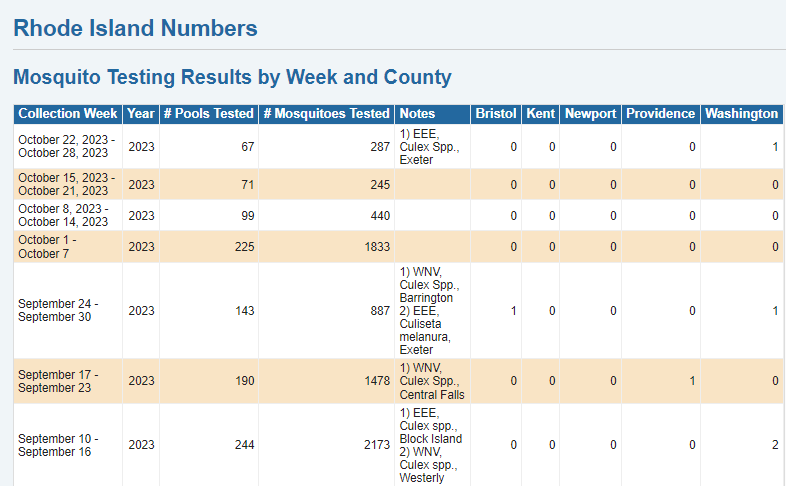Mosquitoes are carriers (vectors) for many diseases, including West Nile Virus (WNV), Eastern Equine Encephalitis (EEE), and Zika Virus. The species of mosquitoes that carry WNV and EEE are found in Rhode Island and bite until the first heavy frost (usually the end of October). The species of mosquitoes that carry Zika Virus are not known to be in Rhode Island any time of year. Everyone who participates in outdoor activities should take actions to protect themselves from mosquito bites.
What You Should Do
Protect yourself
- Put screens on windows and doors. Fix screens that have holes.
- At sunrise and sundown (when mosquitoes who carry WNV or EEE are most active), minimize outside activities. If you must be outside, wear long-sleeved shirts and long pants and use bug spray. If you are traveling to a Zika Virus area, the species of mosquitoes that carry Zika Virus are active throughout the day (dawn through dusk) and are most active at midday.
- Use bug spray with at least 20% DEET (N, N-diethyl-meta-toluamide). Make sure that bug spray does not have more than 30% DEET. Do not use bug spray with DEET on infants. MORE
- Put mosquito netting over playpens and baby carriages.
Get rid of mosquito breeding grounds
- Get rid of anything around your house and yard that collects water. One cup of water can produce thousands of mosquitoes!
- Clean your gutters so that they can drain properly.
- Remove any water from unused swimming pools, boats, or water features and cover them.
- Change the water in birdbaths at least two times a week.
- Help your neighbors, friends and family do the same things.
Protect Yourself and Your Family from Mosquito Bites

Use insect repellent
Use Environmental Protection Agency (EPA)-registered insect repellents with one of the active ingredients below. When used as directed, EPA-registered insect repellents are proven safe and effective, even for pregnant and breastfeeding women.
- DEET
- Picaridin (known as KBR 3023 and icaridin outside the US)
- IR3535
- Oil of lemon eucalyptus (OLE)
- Para-menthane-diol (PMD)
- 2-undecanone
Find the right insect repellent for you by using EPA’s search tool.
Tips for babies and children

- Dress your child in clothing that covers arms and legs.
- Cover strollers and baby carriers with mosquito netting.
- When using insect repellent on your child:
- Always follow label instructions.
- Do not use products containing oil of lemon eucalyptus (OLE) or para-menthane-diol (PMD) on children under 3 years old.
- Do not apply insect repellent to a child’s hands, eyes, mouth, cuts, or irritated skin.
- Adults: Apply insect repellent onto your hands and then apply to a child’s face.
Tips for everyone
- Always follow the product label instructions.
- Reapply insect repellent as directed.
- Do not apply repellent on the skin under clothing.
- If you are also using sunscreen, apply sunscreen first and insect repellent second.
Natural insect repellents (repellents not registered with EPA)
- We do not know the effectiveness of non-EPA registered insect repellents, including some natural repellents.
- To protect yourself against diseases spread by mosquitoes, CDC and EPA recommend using an EPA-registered insect repellent.
- Choosing an EPA-registered repellent ensures the EPA has evaluated the product for effectiveness.
- Visit the EPA website to learn more.

Wear loose-fitting, long-sleeved shirts and pants
Treat clothing and gear
- Use 0.5% permethrin to treat clothing and gear (such as boots, pants, socks, and tents) or buy permethrin-treated clothing and gear.
- Permethrin is an insecticide that kills or repels mosquitoes.
- Permethrin-treated clothing provides protection after multiple washings.
- Read product information to find out how long the protection will last.
- If treating items yourself, follow the product instructions.
- Do not use permethrin products directly on skin.
- Watch the video, What You Need to Know About Permethrin.

Take steps to control mosquitoes indoors and outdoors
- Use screens on windows and doors. Repair holes in screens to keep mosquitoes outdoors.
- Use air conditioning, if available.
- Stop mosquitoes from laying eggs in or near water.
- Once a week, empty and scrub, turn over, cover, or throw out items that hold water, such as tires, buckets, planters, toys, pools, birdbaths, flowerpots, or trash containers.
- Check for water-holding containers both indoors and outdoors.
Learn how to control mosquitos inside and outside your home >>
Prevent Mosquito Bites When Traveling Overseas
Mosquito Bite Prevention for the United States
Mosquito Bites Can Make You Sick
Content provided and maintained by the US Centers for Disease Control and Prevention (CDC). Please see our system usage guidelines and disclaimer.

